Nursing Report: Hyperthyroidism, Hypothyroidism, and Treatment
VerifiedAdded on 2020/03/04
|9
|2773
|84
Report
AI Summary
This report presents a nursing case study examining a patient, Maddy, who experienced hyperthyroidism, thyroid cancer, and subsequent hypothyroidism following a thyroidectomy. The report details Maddy's symptoms, diagnostic blood test results (TSH, Free T4, Free T3), and the progression of her condition. It explores the causes, symptoms, and treatment options for both hyperthyroidism and hypothyroidism, including medications like EUTROXSIG (levothyroxine) and Tertroxin (liothyronine sodium). The report highlights the importance of monitoring TSH levels and the role of nursing interventions in managing patients with thyroid disorders, emphasizing patient education and follow-up care. The case study also discusses the potential side effects of medications and the significance of a balanced diet. The final blood test results and the endocrinologist's interpretation are included, demonstrating the effectiveness of the prescribed treatments and the importance of regular monitoring to ensure the patient's well-being. This report provides a comprehensive overview of thyroid disorders and their management in a clinical setting.
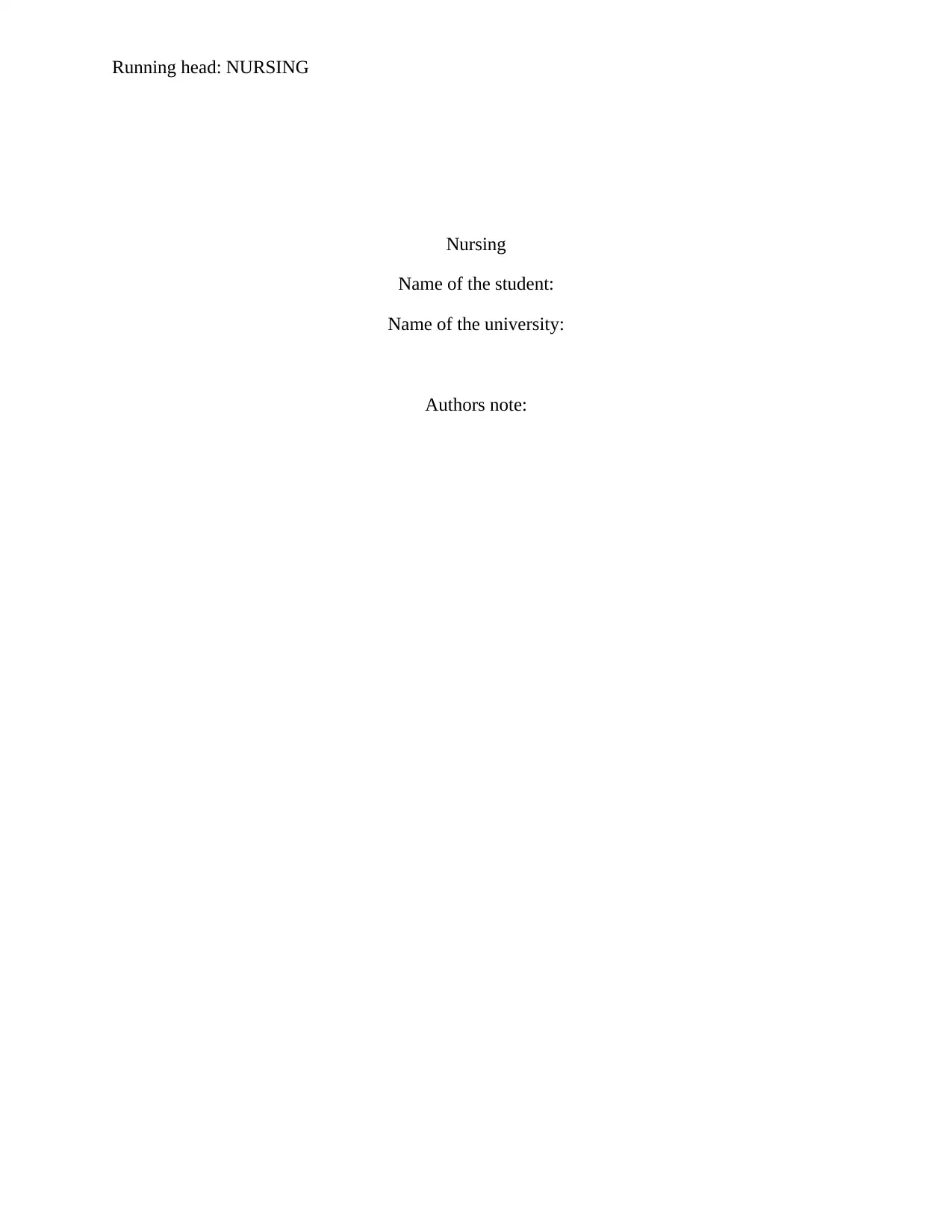
Running head: NURSING
Nursing
Name of the student:
Name of the university:
Authors note:
Nursing
Name of the student:
Name of the university:
Authors note:
Paraphrase This Document
Need a fresh take? Get an instant paraphrase of this document with our AI Paraphraser
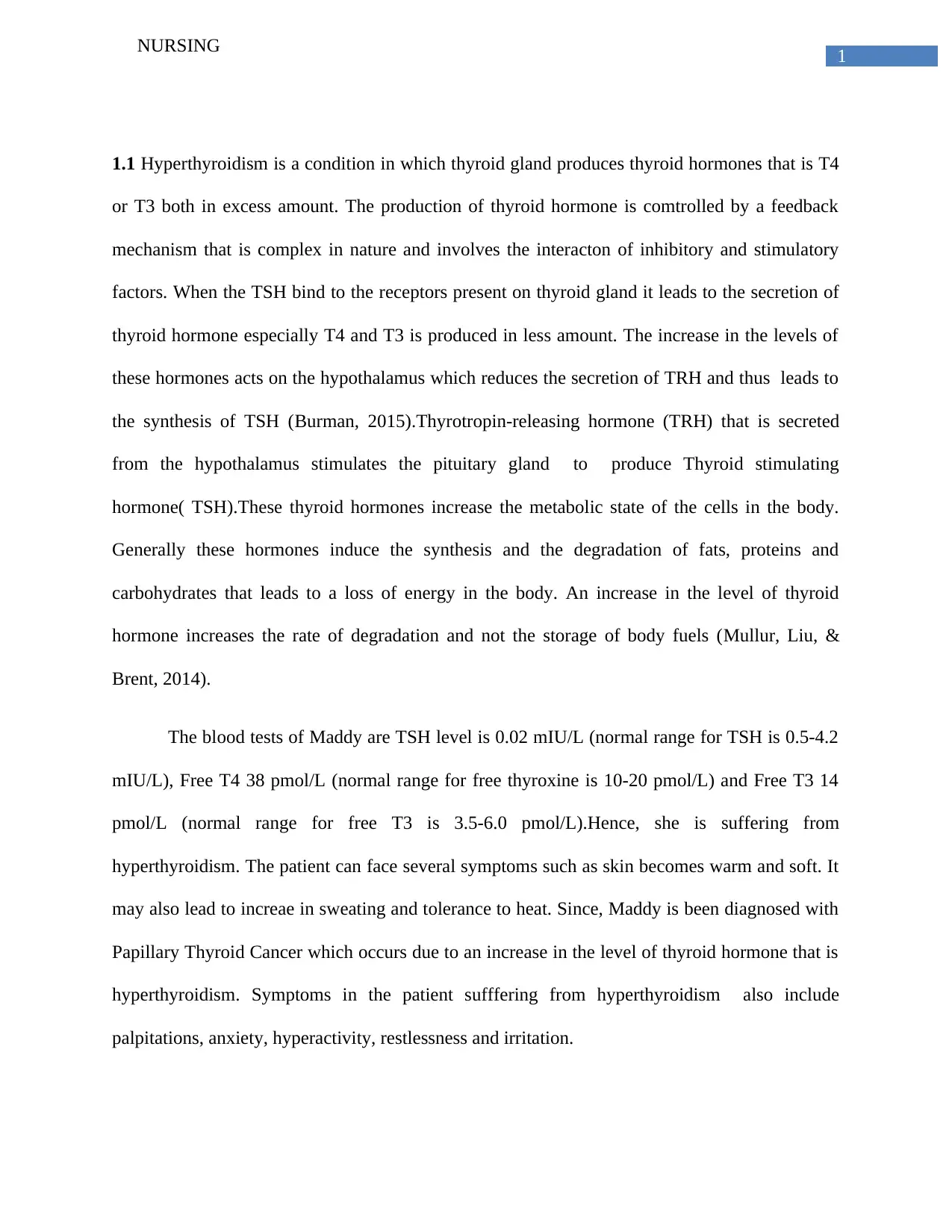
1
NURSING
1.1 Hyperthyroidism is a condition in which thyroid gland produces thyroid hormones that is T4
or T3 both in excess amount. The production of thyroid hormone is comtrolled by a feedback
mechanism that is complex in nature and involves the interacton of inhibitory and stimulatory
factors. When the TSH bind to the receptors present on thyroid gland it leads to the secretion of
thyroid hormone especially T4 and T3 is produced in less amount. The increase in the levels of
these hormones acts on the hypothalamus which reduces the secretion of TRH and thus leads to
the synthesis of TSH (Burman, 2015).Thyrotropin-releasing hormone (TRH) that is secreted
from the hypothalamus stimulates the pituitary gland to produce Thyroid stimulating
hormone( TSH).These thyroid hormones increase the metabolic state of the cells in the body.
Generally these hormones induce the synthesis and the degradation of fats, proteins and
carbohydrates that leads to a loss of energy in the body. An increase in the level of thyroid
hormone increases the rate of degradation and not the storage of body fuels (Mullur, Liu, &
Brent, 2014).
The blood tests of Maddy are TSH level is 0.02 mIU/L (normal range for TSH is 0.5-4.2
mIU/L), Free T4 38 pmol/L (normal range for free thyroxine is 10-20 pmol/L) and Free T3 14
pmol/L (normal range for free T3 is 3.5-6.0 pmol/L).Hence, she is suffering from
hyperthyroidism. The patient can face several symptoms such as skin becomes warm and soft. It
may also lead to increae in sweating and tolerance to heat. Since, Maddy is been diagnosed with
Papillary Thyroid Cancer which occurs due to an increase in the level of thyroid hormone that is
hyperthyroidism. Symptoms in the patient sufffering from hyperthyroidism also include
palpitations, anxiety, hyperactivity, restlessness and irritation.
NURSING
1.1 Hyperthyroidism is a condition in which thyroid gland produces thyroid hormones that is T4
or T3 both in excess amount. The production of thyroid hormone is comtrolled by a feedback
mechanism that is complex in nature and involves the interacton of inhibitory and stimulatory
factors. When the TSH bind to the receptors present on thyroid gland it leads to the secretion of
thyroid hormone especially T4 and T3 is produced in less amount. The increase in the levels of
these hormones acts on the hypothalamus which reduces the secretion of TRH and thus leads to
the synthesis of TSH (Burman, 2015).Thyrotropin-releasing hormone (TRH) that is secreted
from the hypothalamus stimulates the pituitary gland to produce Thyroid stimulating
hormone( TSH).These thyroid hormones increase the metabolic state of the cells in the body.
Generally these hormones induce the synthesis and the degradation of fats, proteins and
carbohydrates that leads to a loss of energy in the body. An increase in the level of thyroid
hormone increases the rate of degradation and not the storage of body fuels (Mullur, Liu, &
Brent, 2014).
The blood tests of Maddy are TSH level is 0.02 mIU/L (normal range for TSH is 0.5-4.2
mIU/L), Free T4 38 pmol/L (normal range for free thyroxine is 10-20 pmol/L) and Free T3 14
pmol/L (normal range for free T3 is 3.5-6.0 pmol/L).Hence, she is suffering from
hyperthyroidism. The patient can face several symptoms such as skin becomes warm and soft. It
may also lead to increae in sweating and tolerance to heat. Since, Maddy is been diagnosed with
Papillary Thyroid Cancer which occurs due to an increase in the level of thyroid hormone that is
hyperthyroidism. Symptoms in the patient sufffering from hyperthyroidism also include
palpitations, anxiety, hyperactivity, restlessness and irritation.
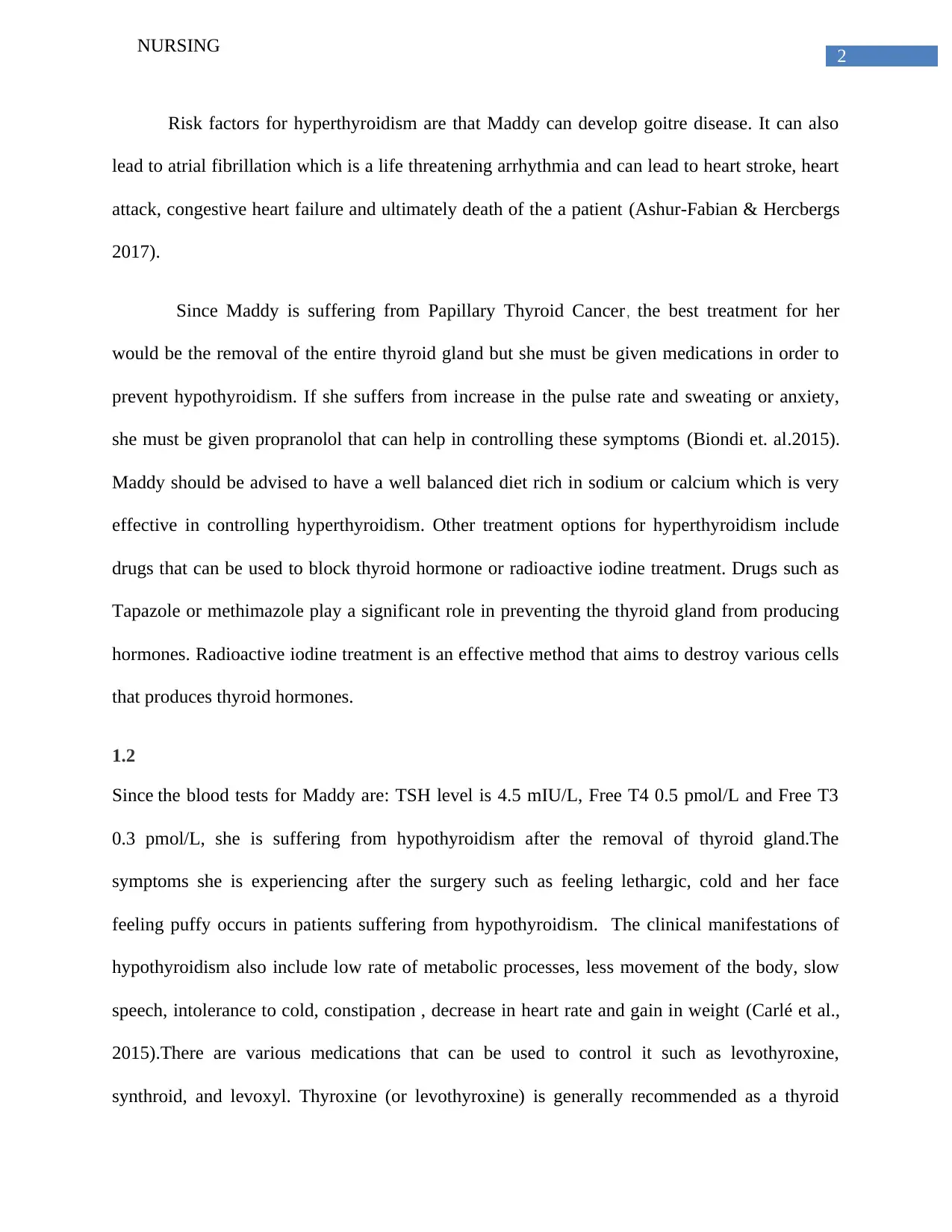
2
NURSING
Risk factors for hyperthyroidism are that Maddy can develop goitre disease. It can also
lead to atrial fibrillation which is a life threatening arrhythmia and can lead to heart stroke, heart
attack, congestive heart failure and ultimately death of the a patient (Ashur-Fabian & Hercbergs
2017).
Since Maddy is suffering from Papillary Thyroid Cancer, the best treatment for her
would be the removal of the entire thyroid gland but she must be given medications in order to
prevent hypothyroidism. If she suffers from increase in the pulse rate and sweating or anxiety,
she must be given propranolol that can help in controlling these symptoms (Biondi et. al.2015).
Maddy should be advised to have a well balanced diet rich in sodium or calcium which is very
effective in controlling hyperthyroidism. Other treatment options for hyperthyroidism include
drugs that can be used to block thyroid hormone or radioactive iodine treatment. Drugs such as
Tapazole or methimazole play a significant role in preventing the thyroid gland from producing
hormones. Radioactive iodine treatment is an effective method that aims to destroy various cells
that produces thyroid hormones.
1.2
Since the blood tests for Maddy are: TSH level is 4.5 mIU/L, Free T4 0.5 pmol/L and Free T3
0.3 pmol/L, she is suffering from hypothyroidism after the removal of thyroid gland.The
symptoms she is experiencing after the surgery such as feeling lethargic, cold and her face
feeling puffy occurs in patients suffering from hypothyroidism. The clinical manifestations of
hypothyroidism also include low rate of metabolic processes, less movement of the body, slow
speech, intolerance to cold, constipation , decrease in heart rate and gain in weight (Carlé et al.,
2015).There are various medications that can be used to control it such as levothyroxine,
synthroid, and levoxyl. Thyroxine (or levothyroxine) is generally recommended as a thyroid
NURSING
Risk factors for hyperthyroidism are that Maddy can develop goitre disease. It can also
lead to atrial fibrillation which is a life threatening arrhythmia and can lead to heart stroke, heart
attack, congestive heart failure and ultimately death of the a patient (Ashur-Fabian & Hercbergs
2017).
Since Maddy is suffering from Papillary Thyroid Cancer, the best treatment for her
would be the removal of the entire thyroid gland but she must be given medications in order to
prevent hypothyroidism. If she suffers from increase in the pulse rate and sweating or anxiety,
she must be given propranolol that can help in controlling these symptoms (Biondi et. al.2015).
Maddy should be advised to have a well balanced diet rich in sodium or calcium which is very
effective in controlling hyperthyroidism. Other treatment options for hyperthyroidism include
drugs that can be used to block thyroid hormone or radioactive iodine treatment. Drugs such as
Tapazole or methimazole play a significant role in preventing the thyroid gland from producing
hormones. Radioactive iodine treatment is an effective method that aims to destroy various cells
that produces thyroid hormones.
1.2
Since the blood tests for Maddy are: TSH level is 4.5 mIU/L, Free T4 0.5 pmol/L and Free T3
0.3 pmol/L, she is suffering from hypothyroidism after the removal of thyroid gland.The
symptoms she is experiencing after the surgery such as feeling lethargic, cold and her face
feeling puffy occurs in patients suffering from hypothyroidism. The clinical manifestations of
hypothyroidism also include low rate of metabolic processes, less movement of the body, slow
speech, intolerance to cold, constipation , decrease in heart rate and gain in weight (Carlé et al.,
2015).There are various medications that can be used to control it such as levothyroxine,
synthroid, and levoxyl. Thyroxine (or levothyroxine) is generally recommended as a thyroid
⊘ This is a preview!⊘
Do you want full access?
Subscribe today to unlock all pages.

Trusted by 1+ million students worldwide
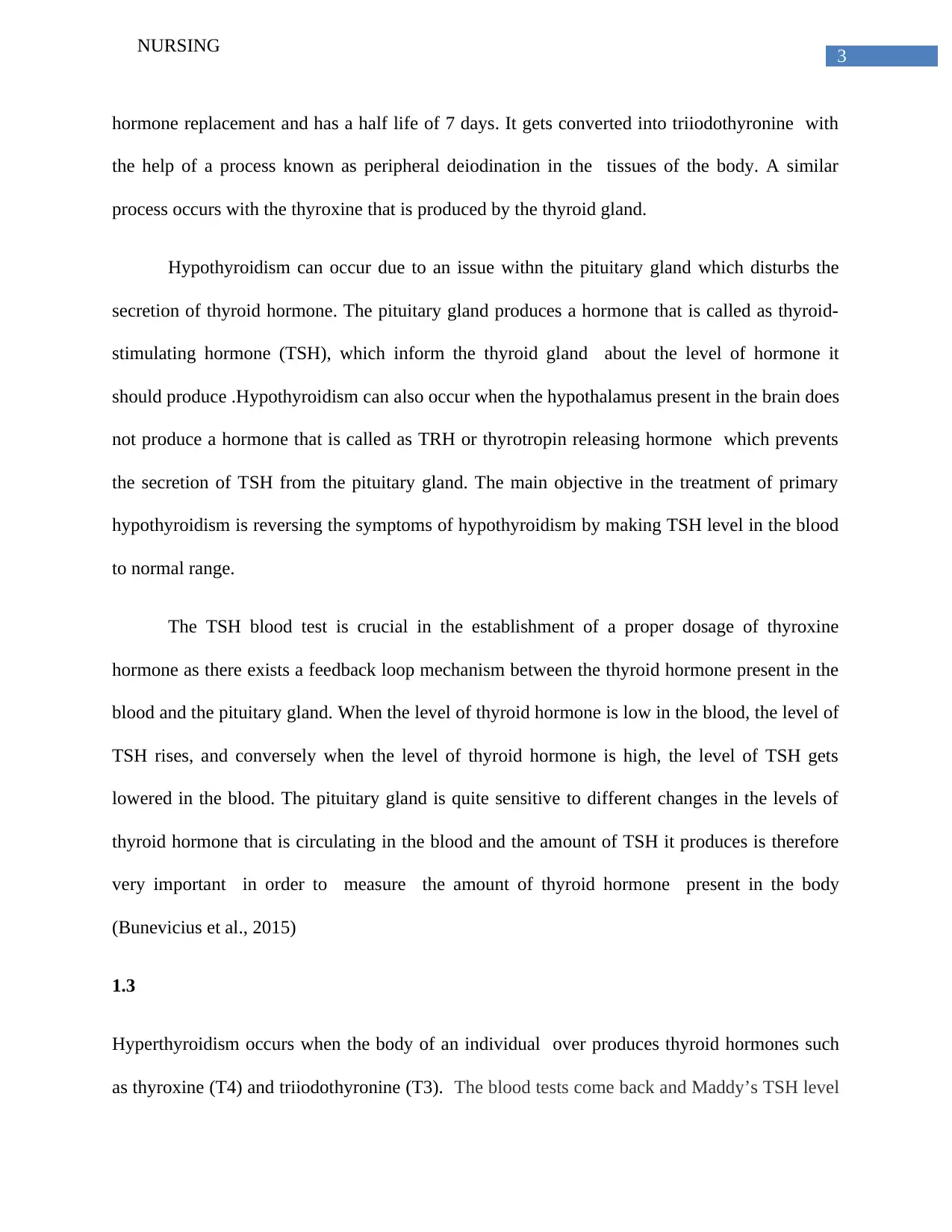
3
NURSING
hormone replacement and has a half life of 7 days. It gets converted into triiodothyronine with
the help of a process known as peripheral deiodination in the tissues of the body. A similar
process occurs with the thyroxine that is produced by the thyroid gland.
Hypothyroidism can occur due to an issue withn the pituitary gland which disturbs the
secretion of thyroid hormone. The pituitary gland produces a hormone that is called as thyroid-
stimulating hormone (TSH), which inform the thyroid gland about the level of hormone it
should produce .Hypothyroidism can also occur when the hypothalamus present in the brain does
not produce a hormone that is called as TRH or thyrotropin releasing hormone which prevents
the secretion of TSH from the pituitary gland. The main objective in the treatment of primary
hypothyroidism is reversing the symptoms of hypothyroidism by making TSH level in the blood
to normal range.
The TSH blood test is crucial in the establishment of a proper dosage of thyroxine
hormone as there exists a feedback loop mechanism between the thyroid hormone present in the
blood and the pituitary gland. When the level of thyroid hormone is low in the blood, the level of
TSH rises, and conversely when the level of thyroid hormone is high, the level of TSH gets
lowered in the blood. The pituitary gland is quite sensitive to different changes in the levels of
thyroid hormone that is circulating in the blood and the amount of TSH it produces is therefore
very important in order to measure the amount of thyroid hormone present in the body
(Bunevicius et al., 2015)
1.3
Hyperthyroidism occurs when the body of an individual over produces thyroid hormones such
as thyroxine (T4) and triiodothyronine (T3). The blood tests come back and Maddy’s TSH level
NURSING
hormone replacement and has a half life of 7 days. It gets converted into triiodothyronine with
the help of a process known as peripheral deiodination in the tissues of the body. A similar
process occurs with the thyroxine that is produced by the thyroid gland.
Hypothyroidism can occur due to an issue withn the pituitary gland which disturbs the
secretion of thyroid hormone. The pituitary gland produces a hormone that is called as thyroid-
stimulating hormone (TSH), which inform the thyroid gland about the level of hormone it
should produce .Hypothyroidism can also occur when the hypothalamus present in the brain does
not produce a hormone that is called as TRH or thyrotropin releasing hormone which prevents
the secretion of TSH from the pituitary gland. The main objective in the treatment of primary
hypothyroidism is reversing the symptoms of hypothyroidism by making TSH level in the blood
to normal range.
The TSH blood test is crucial in the establishment of a proper dosage of thyroxine
hormone as there exists a feedback loop mechanism between the thyroid hormone present in the
blood and the pituitary gland. When the level of thyroid hormone is low in the blood, the level of
TSH rises, and conversely when the level of thyroid hormone is high, the level of TSH gets
lowered in the blood. The pituitary gland is quite sensitive to different changes in the levels of
thyroid hormone that is circulating in the blood and the amount of TSH it produces is therefore
very important in order to measure the amount of thyroid hormone present in the body
(Bunevicius et al., 2015)
1.3
Hyperthyroidism occurs when the body of an individual over produces thyroid hormones such
as thyroxine (T4) and triiodothyronine (T3). The blood tests come back and Maddy’s TSH level
Paraphrase This Document
Need a fresh take? Get an instant paraphrase of this document with our AI Paraphraser
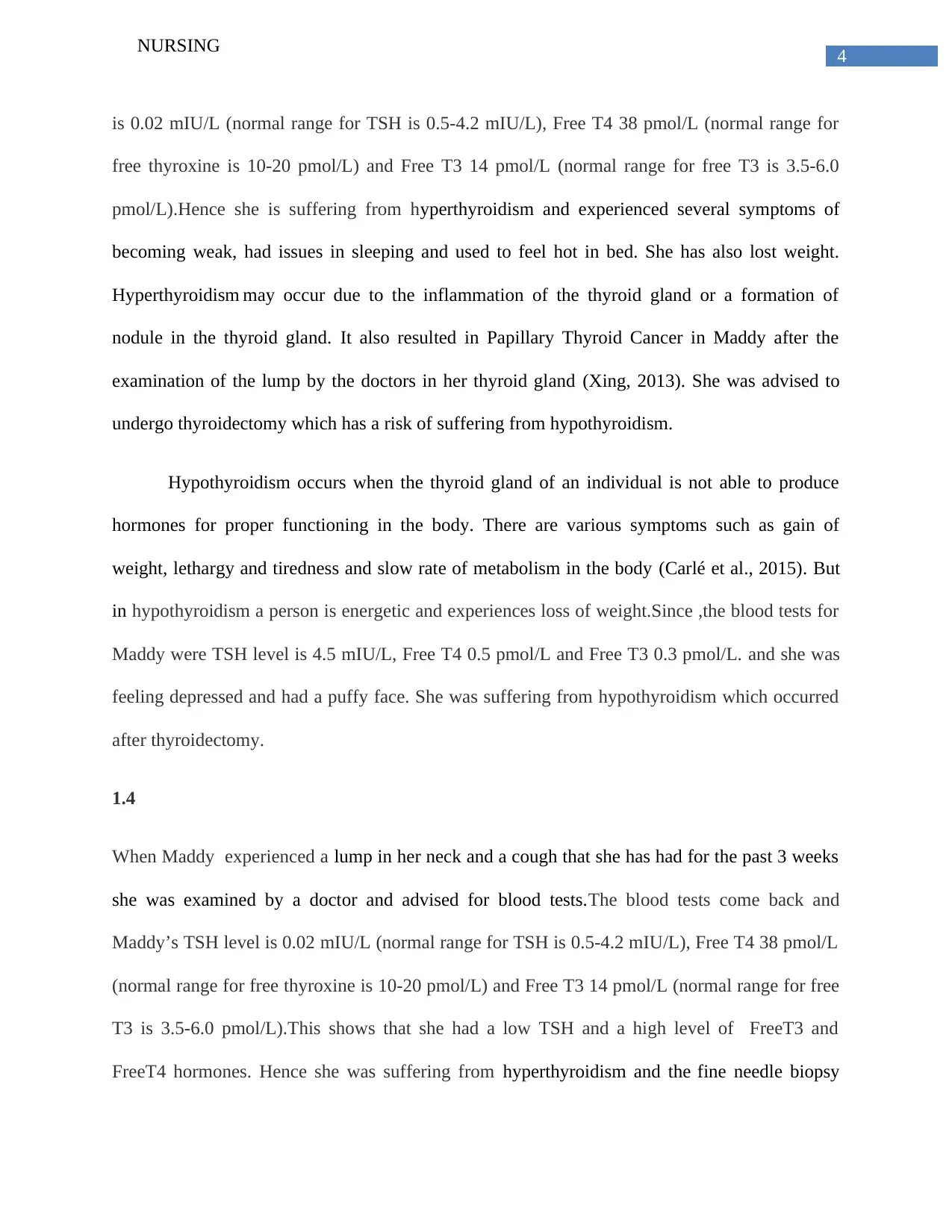
4
NURSING
is 0.02 mIU/L (normal range for TSH is 0.5-4.2 mIU/L), Free T4 38 pmol/L (normal range for
free thyroxine is 10-20 pmol/L) and Free T3 14 pmol/L (normal range for free T3 is 3.5-6.0
pmol/L).Hence she is suffering from hyperthyroidism and experienced several symptoms of
becoming weak, had issues in sleeping and used to feel hot in bed. She has also lost weight.
Hyperthyroidism may occur due to the inflammation of the thyroid gland or a formation of
nodule in the thyroid gland. It also resulted in Papillary Thyroid Cancer in Maddy after the
examination of the lump by the doctors in her thyroid gland (Xing, 2013). She was advised to
undergo thyroidectomy which has a risk of suffering from hypothyroidism.
Hypothyroidism occurs when the thyroid gland of an individual is not able to produce
hormones for proper functioning in the body. There are various symptoms such as gain of
weight, lethargy and tiredness and slow rate of metabolism in the body (Carlé et al., 2015). But
in hypothyroidism a person is energetic and experiences loss of weight.Since ,the blood tests for
Maddy were TSH level is 4.5 mIU/L, Free T4 0.5 pmol/L and Free T3 0.3 pmol/L. and she was
feeling depressed and had a puffy face. She was suffering from hypothyroidism which occurred
after thyroidectomy.
1.4
When Maddy experienced a lump in her neck and a cough that she has had for the past 3 weeks
she was examined by a doctor and advised for blood tests.The blood tests come back and
Maddy’s TSH level is 0.02 mIU/L (normal range for TSH is 0.5-4.2 mIU/L), Free T4 38 pmol/L
(normal range for free thyroxine is 10-20 pmol/L) and Free T3 14 pmol/L (normal range for free
T3 is 3.5-6.0 pmol/L).This shows that she had a low TSH and a high level of FreeT3 and
FreeT4 hormones. Hence she was suffering from hyperthyroidism and the fine needle biopsy
NURSING
is 0.02 mIU/L (normal range for TSH is 0.5-4.2 mIU/L), Free T4 38 pmol/L (normal range for
free thyroxine is 10-20 pmol/L) and Free T3 14 pmol/L (normal range for free T3 is 3.5-6.0
pmol/L).Hence she is suffering from hyperthyroidism and experienced several symptoms of
becoming weak, had issues in sleeping and used to feel hot in bed. She has also lost weight.
Hyperthyroidism may occur due to the inflammation of the thyroid gland or a formation of
nodule in the thyroid gland. It also resulted in Papillary Thyroid Cancer in Maddy after the
examination of the lump by the doctors in her thyroid gland (Xing, 2013). She was advised to
undergo thyroidectomy which has a risk of suffering from hypothyroidism.
Hypothyroidism occurs when the thyroid gland of an individual is not able to produce
hormones for proper functioning in the body. There are various symptoms such as gain of
weight, lethargy and tiredness and slow rate of metabolism in the body (Carlé et al., 2015). But
in hypothyroidism a person is energetic and experiences loss of weight.Since ,the blood tests for
Maddy were TSH level is 4.5 mIU/L, Free T4 0.5 pmol/L and Free T3 0.3 pmol/L. and she was
feeling depressed and had a puffy face. She was suffering from hypothyroidism which occurred
after thyroidectomy.
1.4
When Maddy experienced a lump in her neck and a cough that she has had for the past 3 weeks
she was examined by a doctor and advised for blood tests.The blood tests come back and
Maddy’s TSH level is 0.02 mIU/L (normal range for TSH is 0.5-4.2 mIU/L), Free T4 38 pmol/L
(normal range for free thyroxine is 10-20 pmol/L) and Free T3 14 pmol/L (normal range for free
T3 is 3.5-6.0 pmol/L).This shows that she had a low TSH and a high level of FreeT3 and
FreeT4 hormones. Hence she was suffering from hyperthyroidism and the fine needle biopsy
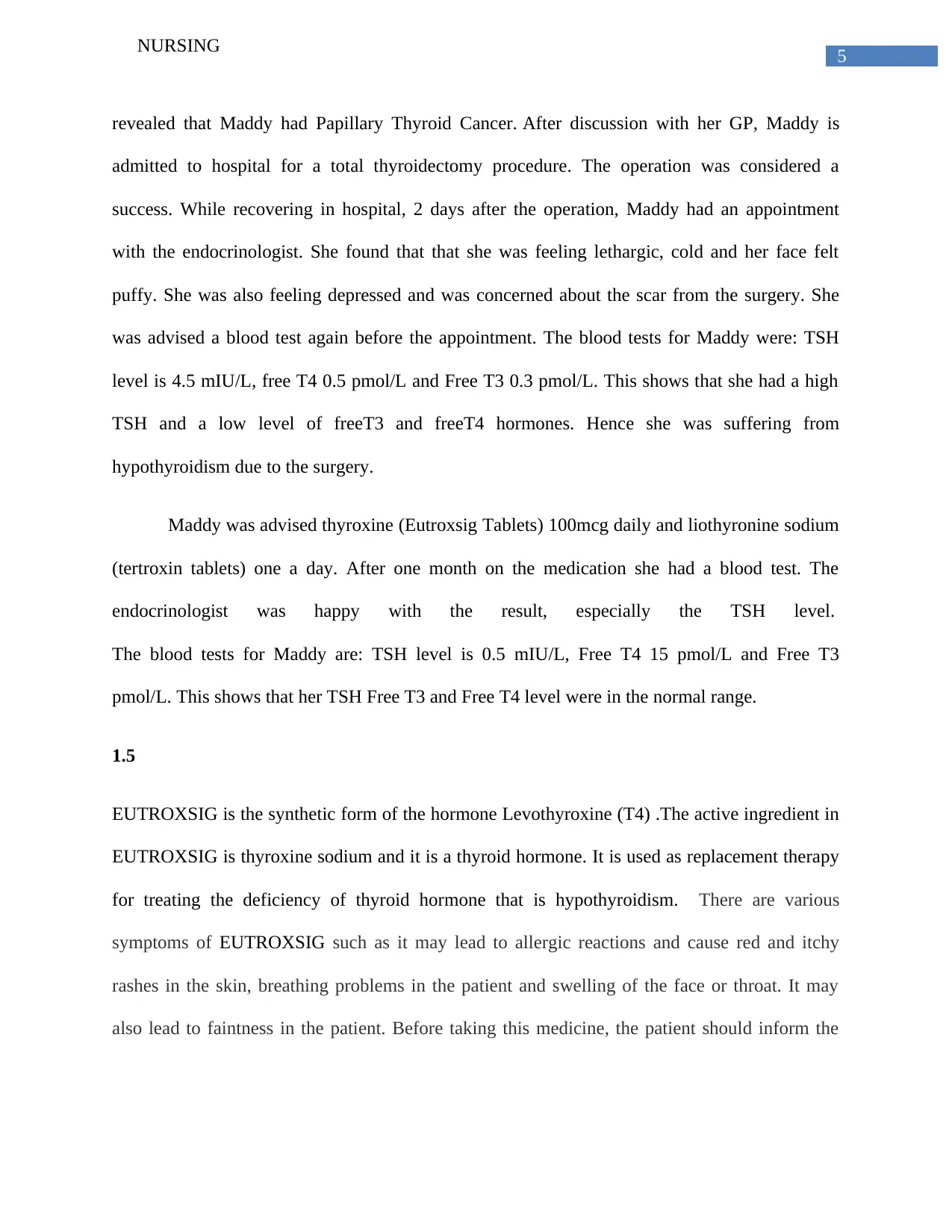
5
NURSING
revealed that Maddy had Papillary Thyroid Cancer. After discussion with her GP, Maddy is
admitted to hospital for a total thyroidectomy procedure. The operation was considered a
success. While recovering in hospital, 2 days after the operation, Maddy had an appointment
with the endocrinologist. She found that that she was feeling lethargic, cold and her face felt
puffy. She was also feeling depressed and was concerned about the scar from the surgery. She
was advised a blood test again before the appointment. The blood tests for Maddy were: TSH
level is 4.5 mIU/L, free T4 0.5 pmol/L and Free T3 0.3 pmol/L. This shows that she had a high
TSH and a low level of freeT3 and freeT4 hormones. Hence she was suffering from
hypothyroidism due to the surgery.
Maddy was advised thyroxine (Eutroxsig Tablets) 100mcg daily and liothyronine sodium
(tertroxin tablets) one a day. After one month on the medication she had a blood test. The
endocrinologist was happy with the result, especially the TSH level.
The blood tests for Maddy are: TSH level is 0.5 mIU/L, Free T4 15 pmol/L and Free T3
pmol/L. This shows that her TSH Free T3 and Free T4 level were in the normal range.
1.5
EUTROXSIG is the synthetic form of the hormone Levothyroxine (T4) .The active ingredient in
EUTROXSIG is thyroxine sodium and it is a thyroid hormone. It is used as replacement therapy
for treating the deficiency of thyroid hormone that is hypothyroidism. There are various
symptoms of EUTROXSIG such as it may lead to allergic reactions and cause red and itchy
rashes in the skin, breathing problems in the patient and swelling of the face or throat. It may
also lead to faintness in the patient. Before taking this medicine, the patient should inform the
NURSING
revealed that Maddy had Papillary Thyroid Cancer. After discussion with her GP, Maddy is
admitted to hospital for a total thyroidectomy procedure. The operation was considered a
success. While recovering in hospital, 2 days after the operation, Maddy had an appointment
with the endocrinologist. She found that that she was feeling lethargic, cold and her face felt
puffy. She was also feeling depressed and was concerned about the scar from the surgery. She
was advised a blood test again before the appointment. The blood tests for Maddy were: TSH
level is 4.5 mIU/L, free T4 0.5 pmol/L and Free T3 0.3 pmol/L. This shows that she had a high
TSH and a low level of freeT3 and freeT4 hormones. Hence she was suffering from
hypothyroidism due to the surgery.
Maddy was advised thyroxine (Eutroxsig Tablets) 100mcg daily and liothyronine sodium
(tertroxin tablets) one a day. After one month on the medication she had a blood test. The
endocrinologist was happy with the result, especially the TSH level.
The blood tests for Maddy are: TSH level is 0.5 mIU/L, Free T4 15 pmol/L and Free T3
pmol/L. This shows that her TSH Free T3 and Free T4 level were in the normal range.
1.5
EUTROXSIG is the synthetic form of the hormone Levothyroxine (T4) .The active ingredient in
EUTROXSIG is thyroxine sodium and it is a thyroid hormone. It is used as replacement therapy
for treating the deficiency of thyroid hormone that is hypothyroidism. There are various
symptoms of EUTROXSIG such as it may lead to allergic reactions and cause red and itchy
rashes in the skin, breathing problems in the patient and swelling of the face or throat. It may
also lead to faintness in the patient. Before taking this medicine, the patient should inform the
⊘ This is a preview!⊘
Do you want full access?
Subscribe today to unlock all pages.

Trusted by 1+ million students worldwide
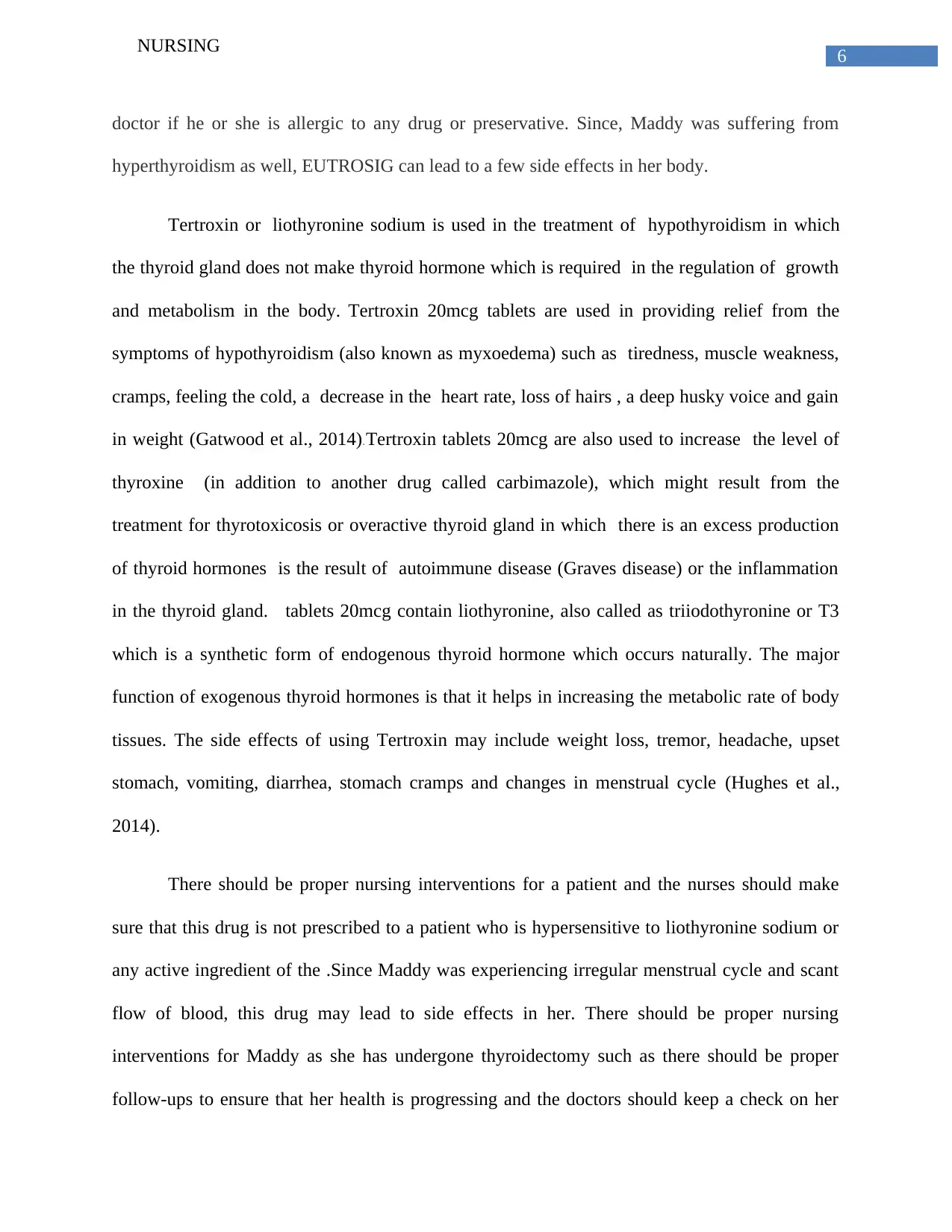
6
NURSING
doctor if he or she is allergic to any drug or preservative. Since, Maddy was suffering from
hyperthyroidism as well, EUTROSIG can lead to a few side effects in her body.
Tertroxin or liothyronine sodium is used in the treatment of hypothyroidism in which
the thyroid gland does not make thyroid hormone which is required in the regulation of growth
and metabolism in the body. Tertroxin 20mcg tablets are used in providing relief from the
symptoms of hypothyroidism (also known as myxoedema) such as tiredness, muscle weakness,
cramps, feeling the cold, a decrease in the heart rate, loss of hairs , a deep husky voice and gain
in weight (Gatwood et al., 2014).Tertroxin tablets 20mcg are also used to increase the level of
thyroxine (in addition to another drug called carbimazole), which might result from the
treatment for thyrotoxicosis or overactive thyroid gland in which there is an excess production
of thyroid hormones is the result of autoimmune disease (Graves disease) or the inflammation
in the thyroid gland. tablets 20mcg contain liothyronine, also called as triiodothyronine or T3
which is a synthetic form of endogenous thyroid hormone which occurs naturally. The major
function of exogenous thyroid hormones is that it helps in increasing the metabolic rate of body
tissues. The side effects of using Tertroxin may include weight loss, tremor, headache, upset
stomach, vomiting, diarrhea, stomach cramps and changes in menstrual cycle (Hughes et al.,
2014).
There should be proper nursing interventions for a patient and the nurses should make
sure that this drug is not prescribed to a patient who is hypersensitive to liothyronine sodium or
any active ingredient of the .Since Maddy was experiencing irregular menstrual cycle and scant
flow of blood, this drug may lead to side effects in her. There should be proper nursing
interventions for Maddy as she has undergone thyroidectomy such as there should be proper
follow-ups to ensure that her health is progressing and the doctors should keep a check on her
NURSING
doctor if he or she is allergic to any drug or preservative. Since, Maddy was suffering from
hyperthyroidism as well, EUTROSIG can lead to a few side effects in her body.
Tertroxin or liothyronine sodium is used in the treatment of hypothyroidism in which
the thyroid gland does not make thyroid hormone which is required in the regulation of growth
and metabolism in the body. Tertroxin 20mcg tablets are used in providing relief from the
symptoms of hypothyroidism (also known as myxoedema) such as tiredness, muscle weakness,
cramps, feeling the cold, a decrease in the heart rate, loss of hairs , a deep husky voice and gain
in weight (Gatwood et al., 2014).Tertroxin tablets 20mcg are also used to increase the level of
thyroxine (in addition to another drug called carbimazole), which might result from the
treatment for thyrotoxicosis or overactive thyroid gland in which there is an excess production
of thyroid hormones is the result of autoimmune disease (Graves disease) or the inflammation
in the thyroid gland. tablets 20mcg contain liothyronine, also called as triiodothyronine or T3
which is a synthetic form of endogenous thyroid hormone which occurs naturally. The major
function of exogenous thyroid hormones is that it helps in increasing the metabolic rate of body
tissues. The side effects of using Tertroxin may include weight loss, tremor, headache, upset
stomach, vomiting, diarrhea, stomach cramps and changes in menstrual cycle (Hughes et al.,
2014).
There should be proper nursing interventions for a patient and the nurses should make
sure that this drug is not prescribed to a patient who is hypersensitive to liothyronine sodium or
any active ingredient of the .Since Maddy was experiencing irregular menstrual cycle and scant
flow of blood, this drug may lead to side effects in her. There should be proper nursing
interventions for Maddy as she has undergone thyroidectomy such as there should be proper
follow-ups to ensure that her health is progressing and the doctors should keep a check on her
Paraphrase This Document
Need a fresh take? Get an instant paraphrase of this document with our AI Paraphraser
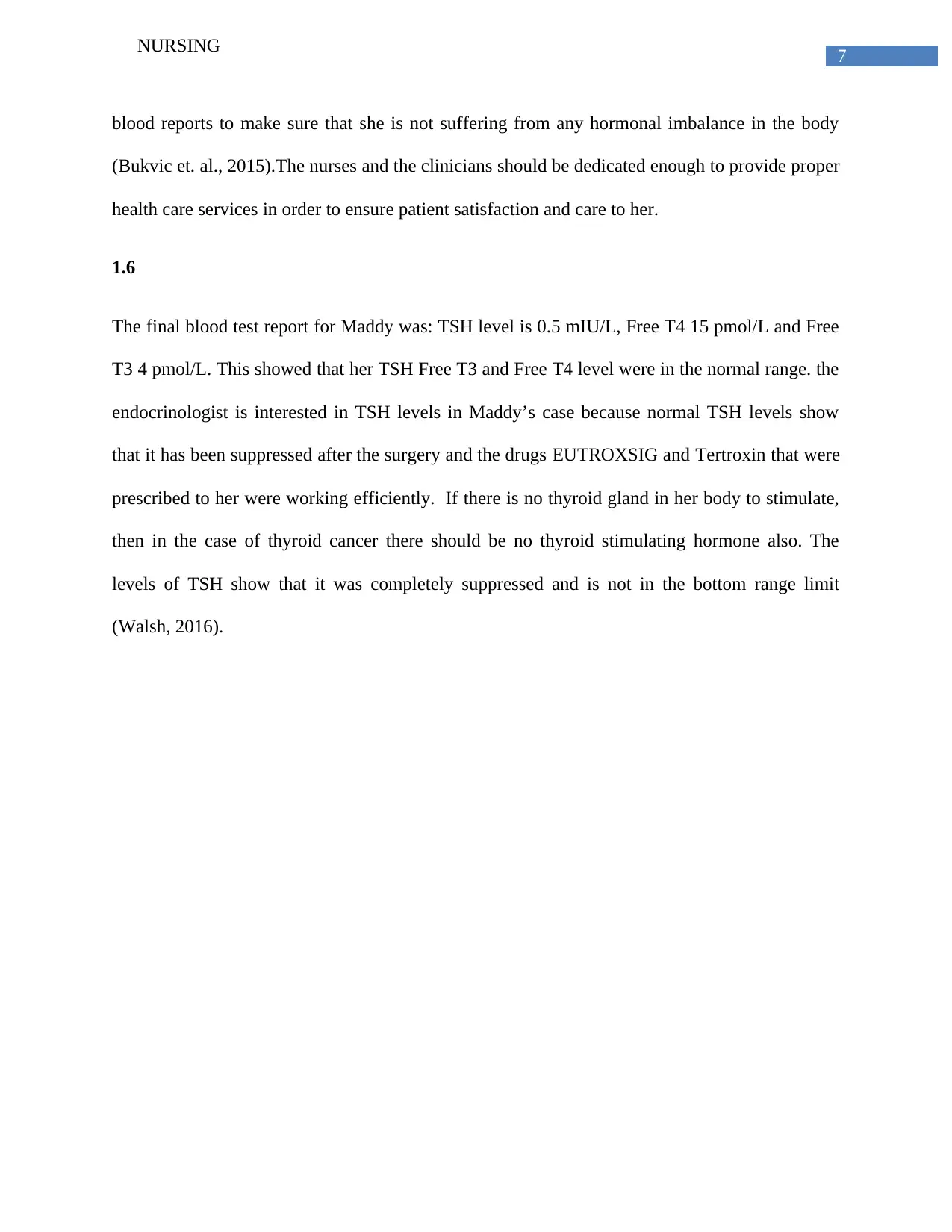
7
NURSING
blood reports to make sure that she is not suffering from any hormonal imbalance in the body
(Bukvic et. al., 2015).The nurses and the clinicians should be dedicated enough to provide proper
health care services in order to ensure patient satisfaction and care to her.
1.6
The final blood test report for Maddy was: TSH level is 0.5 mIU/L, Free T4 15 pmol/L and Free
T3 4 pmol/L. This showed that her TSH Free T3 and Free T4 level were in the normal range. the
endocrinologist is interested in TSH levels in Maddy’s case because normal TSH levels show
that it has been suppressed after the surgery and the drugs EUTROXSIG and Tertroxin that were
prescribed to her were working efficiently. If there is no thyroid gland in her body to stimulate,
then in the case of thyroid cancer there should be no thyroid stimulating hormone also. The
levels of TSH show that it was completely suppressed and is not in the bottom range limit
(Walsh, 2016).
NURSING
blood reports to make sure that she is not suffering from any hormonal imbalance in the body
(Bukvic et. al., 2015).The nurses and the clinicians should be dedicated enough to provide proper
health care services in order to ensure patient satisfaction and care to her.
1.6
The final blood test report for Maddy was: TSH level is 0.5 mIU/L, Free T4 15 pmol/L and Free
T3 4 pmol/L. This showed that her TSH Free T3 and Free T4 level were in the normal range. the
endocrinologist is interested in TSH levels in Maddy’s case because normal TSH levels show
that it has been suppressed after the surgery and the drugs EUTROXSIG and Tertroxin that were
prescribed to her were working efficiently. If there is no thyroid gland in her body to stimulate,
then in the case of thyroid cancer there should be no thyroid stimulating hormone also. The
levels of TSH show that it was completely suppressed and is not in the bottom range limit
(Walsh, 2016).
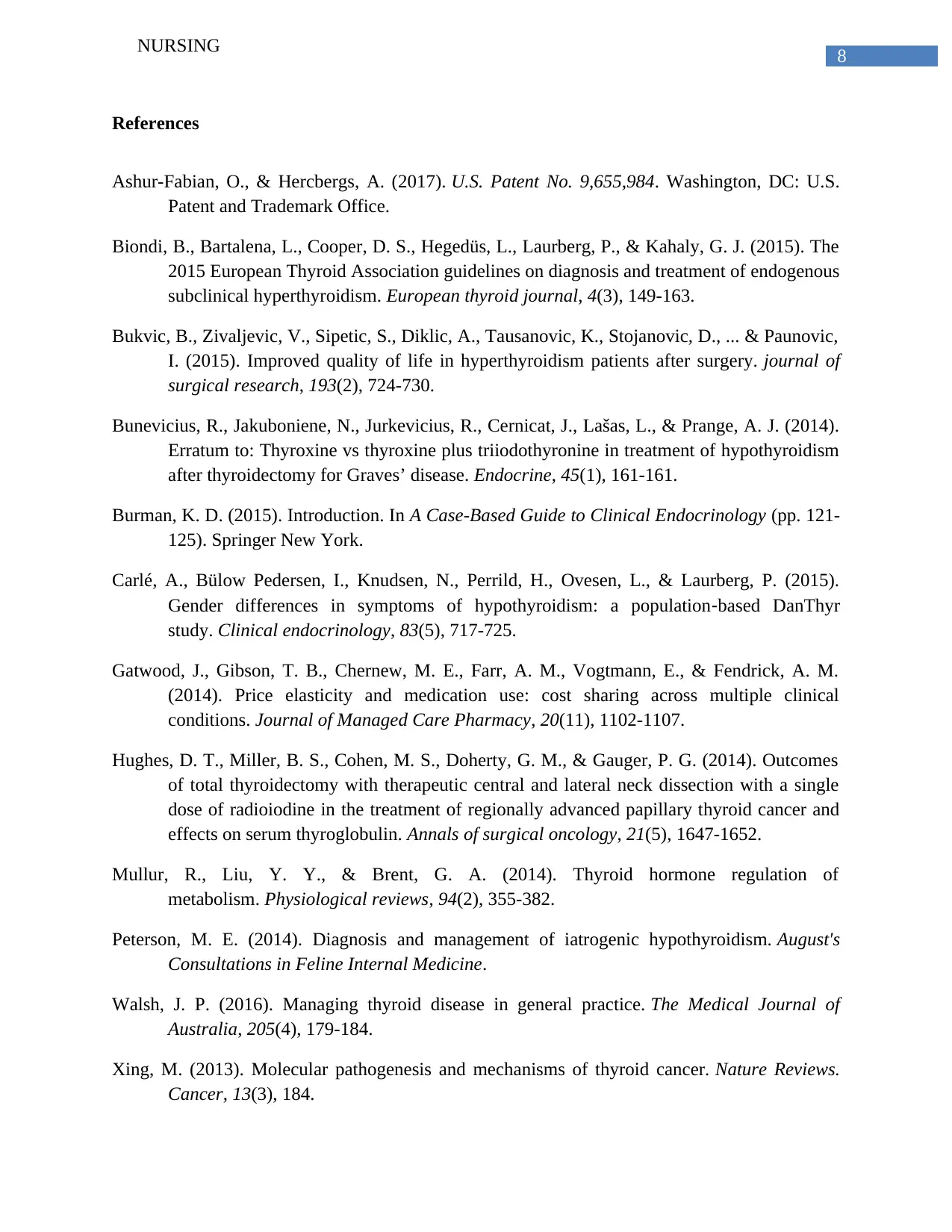
8
NURSING
References
Ashur-Fabian, O., & Hercbergs, A. (2017). U.S. Patent No. 9,655,984. Washington, DC: U.S.
Patent and Trademark Office.
Biondi, B., Bartalena, L., Cooper, D. S., Hegedüs, L., Laurberg, P., & Kahaly, G. J. (2015). The
2015 European Thyroid Association guidelines on diagnosis and treatment of endogenous
subclinical hyperthyroidism. European thyroid journal, 4(3), 149-163.
Bukvic, B., Zivaljevic, V., Sipetic, S., Diklic, A., Tausanovic, K., Stojanovic, D., ... & Paunovic,
I. (2015). Improved quality of life in hyperthyroidism patients after surgery. journal of
surgical research, 193(2), 724-730.
Bunevicius, R., Jakuboniene, N., Jurkevicius, R., Cernicat, J., Lašas, L., & Prange, A. J. (2014).
Erratum to: Thyroxine vs thyroxine plus triiodothyronine in treatment of hypothyroidism
after thyroidectomy for Graves’ disease. Endocrine, 45(1), 161-161.
Burman, K. D. (2015). Introduction. In A Case-Based Guide to Clinical Endocrinology (pp. 121-
125). Springer New York.
Carlé, A., Bülow Pedersen, I., Knudsen, N., Perrild, H., Ovesen, L., & Laurberg, P. (2015).
Gender differences in symptoms of hypothyroidism: a population‐based DanThyr
study. Clinical endocrinology, 83(5), 717-725.
Gatwood, J., Gibson, T. B., Chernew, M. E., Farr, A. M., Vogtmann, E., & Fendrick, A. M.
(2014). Price elasticity and medication use: cost sharing across multiple clinical
conditions. Journal of Managed Care Pharmacy, 20(11), 1102-1107.
Hughes, D. T., Miller, B. S., Cohen, M. S., Doherty, G. M., & Gauger, P. G. (2014). Outcomes
of total thyroidectomy with therapeutic central and lateral neck dissection with a single
dose of radioiodine in the treatment of regionally advanced papillary thyroid cancer and
effects on serum thyroglobulin. Annals of surgical oncology, 21(5), 1647-1652.
Mullur, R., Liu, Y. Y., & Brent, G. A. (2014). Thyroid hormone regulation of
metabolism. Physiological reviews, 94(2), 355-382.
Peterson, M. E. (2014). Diagnosis and management of iatrogenic hypothyroidism. August's
Consultations in Feline Internal Medicine.
Walsh, J. P. (2016). Managing thyroid disease in general practice. The Medical Journal of
Australia, 205(4), 179-184.
Xing, M. (2013). Molecular pathogenesis and mechanisms of thyroid cancer. Nature Reviews.
Cancer, 13(3), 184.
NURSING
References
Ashur-Fabian, O., & Hercbergs, A. (2017). U.S. Patent No. 9,655,984. Washington, DC: U.S.
Patent and Trademark Office.
Biondi, B., Bartalena, L., Cooper, D. S., Hegedüs, L., Laurberg, P., & Kahaly, G. J. (2015). The
2015 European Thyroid Association guidelines on diagnosis and treatment of endogenous
subclinical hyperthyroidism. European thyroid journal, 4(3), 149-163.
Bukvic, B., Zivaljevic, V., Sipetic, S., Diklic, A., Tausanovic, K., Stojanovic, D., ... & Paunovic,
I. (2015). Improved quality of life in hyperthyroidism patients after surgery. journal of
surgical research, 193(2), 724-730.
Bunevicius, R., Jakuboniene, N., Jurkevicius, R., Cernicat, J., Lašas, L., & Prange, A. J. (2014).
Erratum to: Thyroxine vs thyroxine plus triiodothyronine in treatment of hypothyroidism
after thyroidectomy for Graves’ disease. Endocrine, 45(1), 161-161.
Burman, K. D. (2015). Introduction. In A Case-Based Guide to Clinical Endocrinology (pp. 121-
125). Springer New York.
Carlé, A., Bülow Pedersen, I., Knudsen, N., Perrild, H., Ovesen, L., & Laurberg, P. (2015).
Gender differences in symptoms of hypothyroidism: a population‐based DanThyr
study. Clinical endocrinology, 83(5), 717-725.
Gatwood, J., Gibson, T. B., Chernew, M. E., Farr, A. M., Vogtmann, E., & Fendrick, A. M.
(2014). Price elasticity and medication use: cost sharing across multiple clinical
conditions. Journal of Managed Care Pharmacy, 20(11), 1102-1107.
Hughes, D. T., Miller, B. S., Cohen, M. S., Doherty, G. M., & Gauger, P. G. (2014). Outcomes
of total thyroidectomy with therapeutic central and lateral neck dissection with a single
dose of radioiodine in the treatment of regionally advanced papillary thyroid cancer and
effects on serum thyroglobulin. Annals of surgical oncology, 21(5), 1647-1652.
Mullur, R., Liu, Y. Y., & Brent, G. A. (2014). Thyroid hormone regulation of
metabolism. Physiological reviews, 94(2), 355-382.
Peterson, M. E. (2014). Diagnosis and management of iatrogenic hypothyroidism. August's
Consultations in Feline Internal Medicine.
Walsh, J. P. (2016). Managing thyroid disease in general practice. The Medical Journal of
Australia, 205(4), 179-184.
Xing, M. (2013). Molecular pathogenesis and mechanisms of thyroid cancer. Nature Reviews.
Cancer, 13(3), 184.
⊘ This is a preview!⊘
Do you want full access?
Subscribe today to unlock all pages.

Trusted by 1+ million students worldwide
1 out of 9
Related Documents
Your All-in-One AI-Powered Toolkit for Academic Success.
+13062052269
info@desklib.com
Available 24*7 on WhatsApp / Email
![[object Object]](/_next/static/media/star-bottom.7253800d.svg)
Unlock your academic potential
Copyright © 2020–2026 A2Z Services. All Rights Reserved. Developed and managed by ZUCOL.





